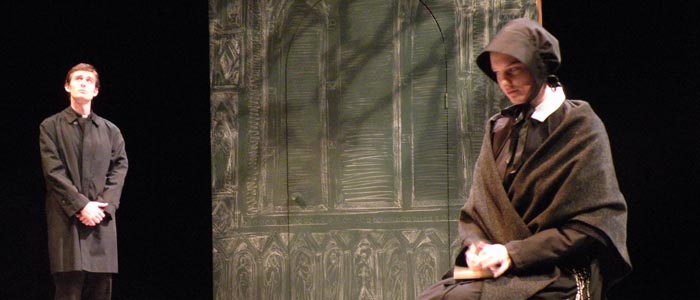“What do you do when you’re not sure?”
Thus begins Doubt, John Patrick Shanley’s Tony Award-winning masterpiece on morality. A quiet and minimalist play, encompassing a single act (no intermission) and featuring only four actors, Doubt nonetheless manages to pummel its audiences with its refusal to take a side in a frustrating and frightening debate.
First performed in the midst of the Catholic Church sex abuse scandals, Doubt tells the story of Sister Aloysius, a nun and strict principal of a Bronx Catholic school, trying to unravel a mystery involving Father Flynn, a much-loved priest and Donald Muller, the only black student.
Sister Aloysius tries to recruit the help of Sister James, a young nun who is Donald’s teacher, and Mrs. Muller herself, but the play is primarily about Aloysius’s independence and stubborn tenacity.
Conn’s recent production of Doubt (put on the weekend before Thanksgiving break) stayed true to the original text while still allowing the actors to flesh out their complicated characteristics.
Most brilliant of all was senior Sarah Hornbach, who completely disappeared into her role as Sister Aloysius. Wearing a restrictive nun’s habit, thick-rimmed glasses and an intimidating scowl for the entire performance, Hornbach was practically unrecognizable from the pink-shirted student who mingled with audience members after the show. She spat her lines out like acid and made any onstage situation as uneasy as possible.
The fear in her eyes when she realized the possibility of sexual abuse in her school could be seen from the back row.
Portraying the ambiguous Father Flynn was senior Charles Cochran. He read his lines with an unusual accent, something that I struggled to describe to others, finally settling on “a Kennedy gone Australian”. Cochran was most effective when Father Flynn was at his angriest – when he raised his voice, you recoiled.
Still, his character oozed uncomfortable charm, making moments like teaching the boys basketball and asking for three lumps of sugar in his tea oddly satisfying to watch.
As Sister James, sophomore Kristin Hutchins displayed lovable, earnest innocence with a touch of airheadedness. The audience connects the most with Sister James – we have been sucked into this confusing world just as suddenly as she has – so it is important to make the role as real as possible. Sometimes, Hutchins’s sweet smile would distract from her impending conflict, but it was nonetheless a strong Main Stage debut.
In one of the smallest and most powerful roles was sophomore Shani Brown as Donald’s mother, Mrs. Muller. Although her role lasts about ten minutes, Mrs. Muller’s steadfastness was sometimes inspiring, other times appalling. The dialogue between Mrs. Muller and Sister Aloysius started awkwardly, but that could be tied to the character adapting to an uncomfortable situation. Once the conversation picks up, it really works, sending chills down the audience members’ backs.
Back in October, audiences were amazed by The Tempest’s illustrious, breathtaking set design, complete with swinging vines, real ferns and attention to detail. Doubt went the complete other direction, creating a flat space with only a few props for the actors to work with. This minimalist set design worked to create looming, lonely spaces to perform in. Cochran, as a priest, seemed most at home in this space, addressing his audience as if in a great cathedral.
Most effective in the set changes had to be the run crew. Normally a job requiring black to be worn (so as not to distract from the action), the two run crew members were dressed as characters – one as a nun and the other as a schoolboy. This allowed for surprisingly smooth transitions and helped add to the general atmosphere of the play.
The audience left Doubt with more questions than answers, and that’s how the play likes it. Even after the actors took their bows, the discussions and debates continue.
A smart play smartly directed, Doubt is a favorite of mine because when the audience leaves a performance, the opinion they carry with them depends on how the roles were performed. In this case, the roles were performed exceptionally well.











Great job! That Sarah Hornbach is really something!